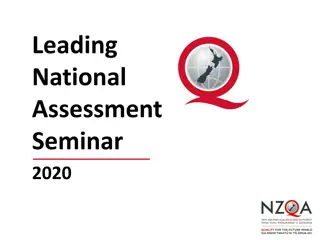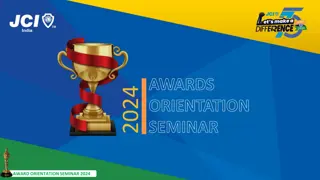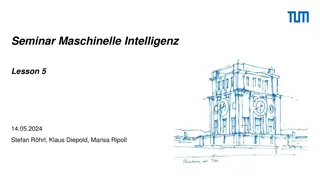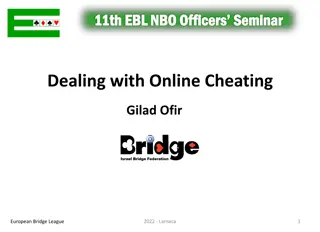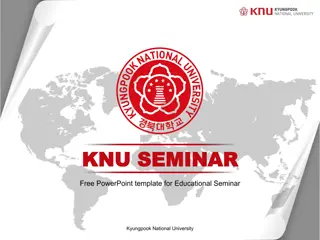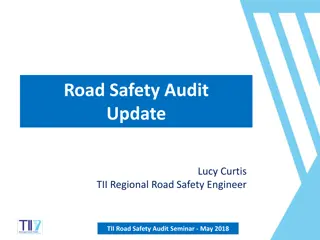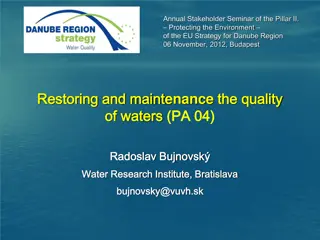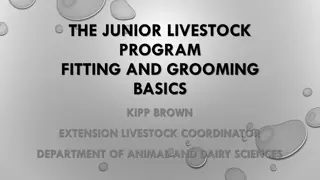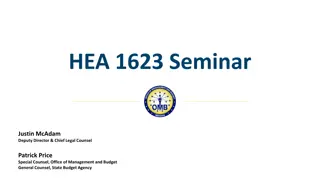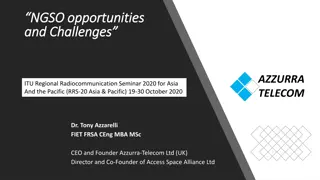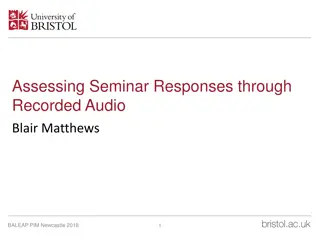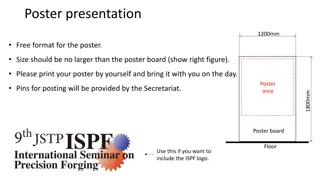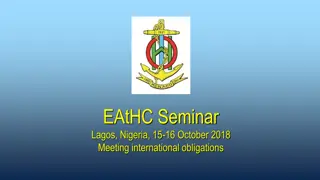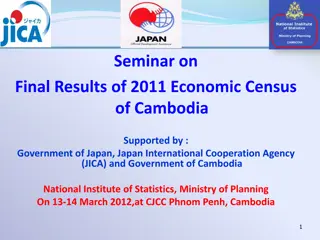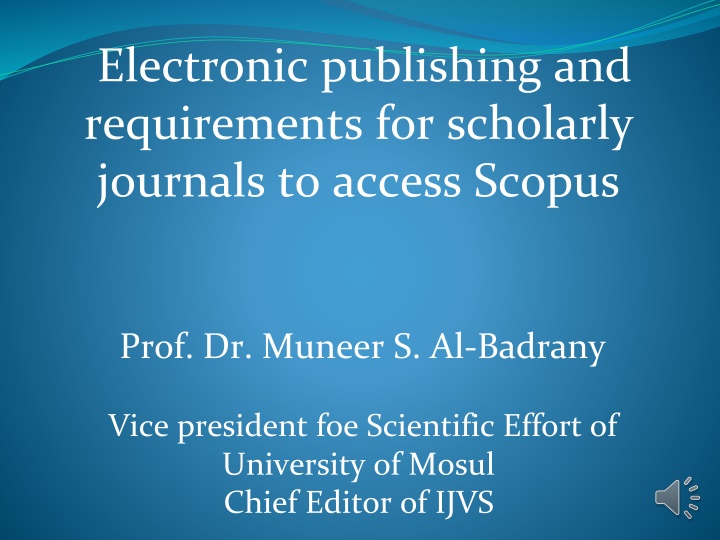
Enhancing Accessibility of Iraqi Scholarly Journals to Scopus Database
Learn about the efforts led by Prof. Dr. Muneer S. Al-Badrany to improve the access of Iraqi academic journals to the prestigious Scopus database. Discover the importance of meeting the requirements for inclusion and the challenges faced in this endeavor.
Download Presentation

Please find below an Image/Link to download the presentation.
The content on the website is provided AS IS for your information and personal use only. It may not be sold, licensed, or shared on other websites without obtaining consent from the author. If you encounter any issues during the download, it is possible that the publisher has removed the file from their server.
You are allowed to download the files provided on this website for personal or commercial use, subject to the condition that they are used lawfully. All files are the property of their respective owners.
The content on the website is provided AS IS for your information and personal use only. It may not be sold, licensed, or shared on other websites without obtaining consent from the author.
E N D
Presentation Transcript
Electronic publishing and requirements for scholarly journals to access Scopus Prof. Dr. Muneer S. Al-Badrany Vice president foe Scientific Effort of University of Mosul Chief Editor of IJVS
Iraqi Academic Scientific Journals https://iraqjournals.com/?list=0
Scopus Scopus is a database containing summaries and references from articles published in academic journals. It covers almost 22,000 titles from more than 5,000 publishers, of which 20,000 are journals evaluated by experts in scientific, technical, medical and social specialties humanities). Owned by the founder of the printing company, Elsevier, it subscribing to it. Scopus searches also include searches in patent databases (including arts and is available online by
It is a database and citations launched in 2004. It is designed to simplify the access of researchers, students, teachers, and general peer review users Worldwide Academic Publications in All Sciences, Arts, and academic publishing industry is in constant flux, and recent years have brought more challenges in assessing the proliferation of open-access journals, online publishing only and the proliferation of new publishers, publishing strategies and business models. Quality Evaluation Humanities. The
Our goals are to introduce University journals to the Scopus, which is part of the University Ranking. Or at least the honor of attempting. Most of the university ingredients to enter Scopus, but the problem is in the way in addition to the presence of deficiencies that we need to complete. journals have many I feel sad when I review Journals in the world in Scopus as many Arab and regional countries have many journals, while Iraq has only 3 Journals and two of them have no SJR impact factor yet.
The position of some states in Scopus Jordan 6 Journals Saudi Arabia 12 Journals Egypt 19 Journals Israel 23 Journals Iran 74 Journals Turkey 65 Journals IRAQ 3 Journals
The reason is not that we do not have high-end Journals, quite the opposite. We have many high-end Journals. Our national duty as Academic staff requires us to work hard to upgrade the Journals to reach a stage that qualifies them to enter the Scopus
Inserting University Journals into the Scopus, or at least some of the University Journals into the Scopus, and we need to remember that the journey of thousands of miles begins with the first step
Requirements Electronic publishing: Includes a distinguished website on the Internet With total reliance on the electronic publishing mechanism from receiving the manuscript to acceptance in an easy and simple way. e ISSN and p ISSN Digital Object Identifier System DOI (DOIs) Directory of open Access journal DOAJ Committee on Publication Ethics (COPE)
Academic publishing In academic publishing, a paper is an academic work that is usually published in an academic journal It contains original research results or reviews existing results. also called an article, will only be considered valid if it undergoes a process of peer review by one or more referees (who are academics in the same field
This process typically takes several months. Next, there is often a delay of many months (or in some fields, over a year) before an accepted manuscript appears able for publication in the journal
Most journals, particularly newer ones, are now published in electronic form only. Paper journals are now generally made available in electronic form as well, both to individual subscribers, and to libraries Electronic versions are available to subscribers immediately open access journals
II-ISSN International Standard Serial Number ISSN It is 8-digit code used to identify newspapers, journals, magazines and periodicals of all kinds and on all media print and electronic. p ISSN, e ISSN
Many countries in the world have a national center for granting this number, except for Iraq. I took the initiative with the site in order to request eISSN for all journals of the University of Mosul where I filled out the special forms for all journals and succeeded in granting all journals of the University of Mosul eISSN and try to obtain a national center for Iraq to grant this number and thus the university has a leading role to deal with this number. And that is a service for the university first and Journals of Iraqi Universities
Dear Sirs, Thank you for your message and your interest in the ISSN. The adhesion to ISSN Statutes is an official process. The first step to be taken is to accede to the Statutes of the International Centre, which is an intergovernmental organisation whose activities are conducted for the benefit of Member States. You will find the English version of our Statutes on our web site, at the following address: https://www.issn.org/the-centre-and-the-network/members- countries/become-a-member-of-the-issn-network/ The Iraq Government should send a letter to Mrs Audrey Azoulay, Director General of UNESCO, stating that Iraq accedes to the Statutes of the International Centre for the Registration of Serial publications (ISSN International Centre). In this letter, the organisation which will host the ISSN National Centre should also be mentioned as the official body designated to act as the ISSN National Centre. Please note that this letter should be signed by the highest authorities of the country, i.e. either the Head of State, the Head of Government, or the Minister of Foreign Affairs, or else, by a person having full powers issued by one of these three authorities.
III- Digital Object Identifier System DOIs DOI is in wide use mainly to identify academic, professional, and government information, such as journal articles, research reports and data sets, and official publications though they also have been used to identify other types of information resources, such as commercial videos.
The DOI for a document remains fixed over the lifetime of the document, whereas its location and other metadata may change. every time a URL changes, the publisher has to update the metadata for the DOI to link to the new URL It is the publisher's responsibility to update the DOI database. If they fail to do so, the DOI resolves to a leaving the DOI useless.
Digital objective identifiers are not open to all new players to use, as its use requires a degree of central coordination, only institutions can fulfill the contractual obligations required by the DOI system and are able to pay Fees required for its admission to the system and for the identification of identifiers for its documents. The system is being implemented by a coalition of registry organizations that coordinate their efforts with the DOI Foundation
DOI consists of Prefix I have obtained it for the whole Mosul University, meaning all University publications from a scientific research journal, message or conference that will contain this part, which is symbolized by the University of Mosul It is: 10.33899 Then the suffix, then the registry, and define the registrar: 10.33899 / ijvs.2019 No. of the manuscript
(DOAJ) It is a website that hosts a community-sponsored list of open access journals, maintained by infrastructure services for open access. The project defines open journals as scientific and academic journals that can access all of their content for free, without delay or user registration requirements, and meet high quality standards, so that they are Include the journal, as rights to "read, download, copy, distribute, print, search, or link to the full text of [articles], or use it for any other legal purpose. DOAJ aims to "increase visibility, accessibility, reputation, use and impact in peer-reviewed scientific research journals and open access."
In 2015, DOAJ launched the re-submission process based on updated and expanded inclusion criteria. At the end of the process (December 2017), nearly 5,000 Journals, out of 11,600 indexed in May 2016, were removed from their database, mostly due to lack of resubmission. Despite this major cleaning, the number of Journals included in DOAJ has continued to grow, reaching 12,728 as of February 25, 2019.
COPE Committee (COPE) The COPE is a forum for peer-reviewed journal editors to discuss issues related to the integrity of the scientific record. It supports and encourages editors to report, index, and incite ethical problems in the publishing process. on Publication Ethics
COPE was founded in 1997 by a group of medical journal editors publishing misconduct, for example literary theft, actual or redundant attempt to publish, attempts to pass fraudulent data, unethical research, confidentiality Originally a loose congregation of individuals COPE was now a limited company ("merged") and registered organization"). interested in violations, etc. charity ("non-profit
https://publicationethics.org/journ al-membership-application-form-1

